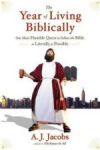I’m reading through the Bible in a year using resources from YouVersion on my phone and on the web. I’ve done this before and remember a similar feeling as I approached and began to read through the book of Leviticus a few weeks ago. The feeling can best be described in one-word, “ugh”. I’m not even sure if that’s a legitimate word.
The first five books of the Bible (Genesis, Exodus, Leviticus, Numbers, and Deuteronomy), referred to as “the Torah” represent the Law of God. As a New Testament Christian I usually breeze through the reading of ‘The Law’ and conclude it with a “thank You, Jesus” prayer. I think the common-thought among Christians is one of thankfulness that we’re no longer bound by the Law – but in doing so, we miss the emphasis Jesus placed on it in Matthew 5:17 – “Do not think that I have come to abolish the Law or the Prophets; I have not come to abolish them but to fulfill them.”
So, instead of looking at the Law as something that is no longer relevant (since Jesus lived, died, and was resurrected), we must look deeper into the Law and see if and how it applies to us as Christians today.
Just a week-or-so ago I stumbled on a great article through my good friend Greg Saldi that I thoroughly enjoyed reading. It is entitled, “Getting the Most from Old Testament Law, Part 1” and was written by Matt Proctor, the acting president of Ozark Christian College in Missouri.
 In the article, Proctor refers often to the book “The Year of Living Biblically” by A.J. Jacobs – a book that has been on my wishlist since its printing in 2008. I have still yet to read the book, but I am consistently intrigued by the questions that arise amongst Christians and non-Christians alike at how important ‘the Law’ is at understanding our place in God’s plan, the role of sacrifice in that plan, and the magnitude of grace.
In the article, Proctor refers often to the book “The Year of Living Biblically” by A.J. Jacobs – a book that has been on my wishlist since its printing in 2008. I have still yet to read the book, but I am consistently intrigued by the questions that arise amongst Christians and non-Christians alike at how important ‘the Law’ is at understanding our place in God’s plan, the role of sacrifice in that plan, and the magnitude of grace.
While I don’t completely agree with everything Proctor purports, there are a few discussion-starting jump-off points that grabbed my attention:
On the purposes of the Law:
“So when God gives the Law, God is totally redefining the Israelites’ self-identity. By establishing a covenant with Israel, he is offering ot extend his protection and care. Suddenly the Israelites were no longer the human garbage of Egypt; they were chosen and privileged! God wanted them! Israel never understood the Law as a means of salvation – hoops to jump through to earn God’s favor. God had already saved Israel in the Exodus, before the Law was even handed down. Rather, after experiencing God’s incredible redemption from slavery, the Israelites understood the Law as another act of grace. It signified God’s desire for an ongoing relationship.”
On the Law looking a lot like works-based righteousness:
“If you’re chosen to play football for Notre Dame, you don’t have to wear a gold helmet and slap the famous “Play Like a Champion Today” sign. You get to. And if you’re chosen as the people of God, you don’t have to obey the Law. You get to. To live within the Law was a privilege – part of a new identity.”
If you’re interested in reading the article by Proctor, it is available here as a PDF. And if you do read it, I’d love for you to add your thoughts/remarks in the comments here on the blog!










